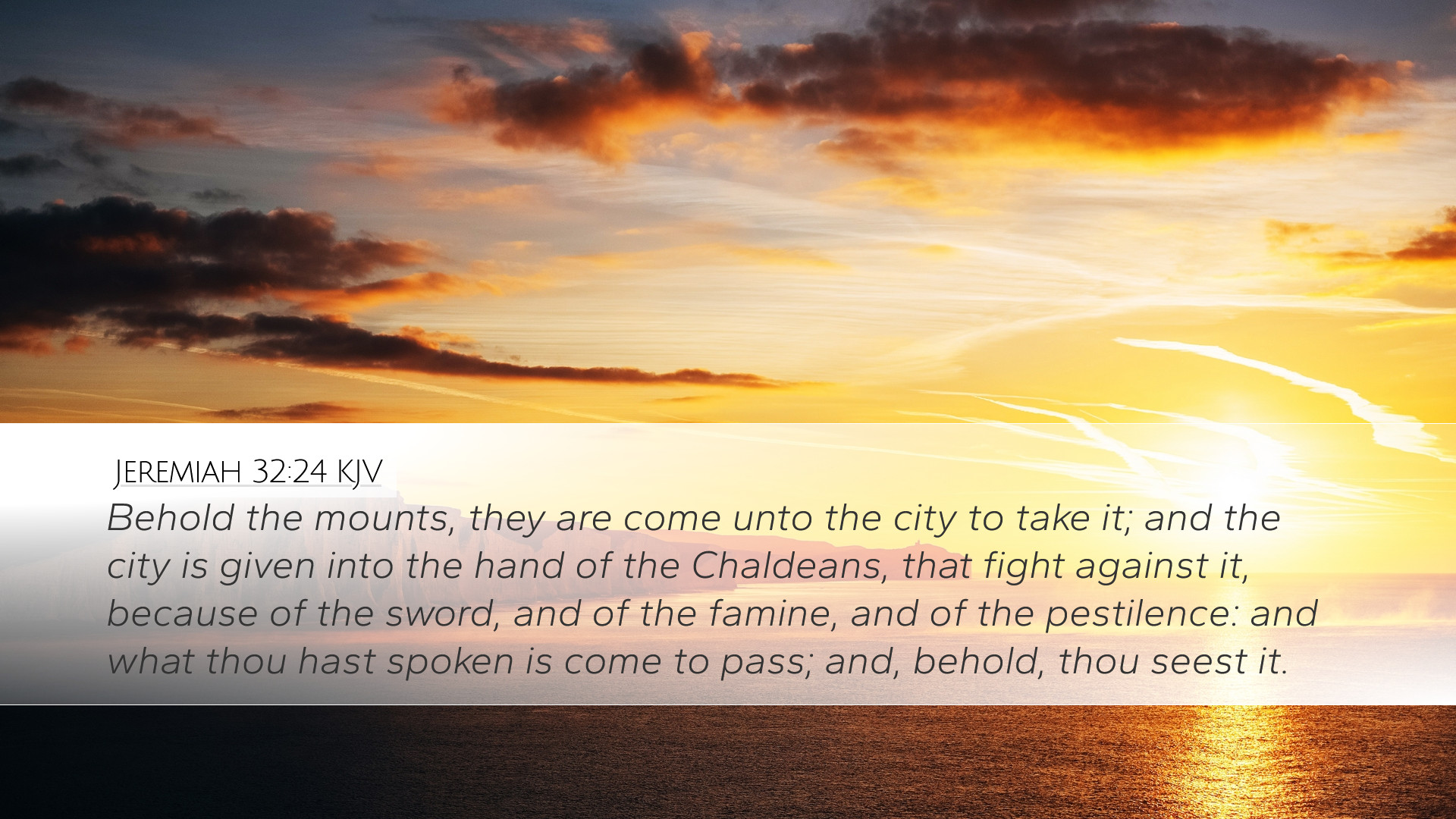Bible Commentary on Jeremiah 32:24
Verse: "Behold the mounts, they are come unto the city to take it; and the city is given into the hand of the Chaldeans, which fight against it; because of the sword, and of the famine, and of the pestilence; and what thou hast spoken is come to pass; and, behold, thou seest it." (Jeremiah 32:24)
Introduction
This verse occurs within a context of immense historical and spiritual significance, as it encapsulates the imminent siege of Jerusalem and the prophecies regarding its downfall. The juxtaposition of God's faithfulness against the backdrop of human despair provides a profound basis for understanding divine sovereignty amid tumultuous circumstances.
Contextual Analysis
Historical Context: The prophecy presented in Jeremiah 32 takes place during a critical phase of Israel’s history, as the impending Babylonian conquest looms large. The verse reflects Jeremiah’s deep awareness of both the physical siege by the Chaldean forces and the spiritual implications of God’s judgment against unrepentant Israel.
Theological Context: This passage also serves to reaffirm God’s promises to Israel, emphasizing that despite the turmoil, His plans will ultimately prevail. Scholars point out that the mention of “the mounts” conveys both a literal and symbolic meaning— the Babylonians are physically encircling Jerusalem, while spiritually, God's judgment is tightening its grip on a disobedient nation.
Commentary Insights
Matthew Henry's Perspective
Matthew Henry emphasizes the certainty of prophecy and the fulfillment of God's word. He argues that the sight of the enemy camps is not merely a physical observation but also serves as a spiritually charged moment. Henry notes:
- The phrase “behold the mounts” invites both Jeremiah and the reader to “see” the reality of God’s warnings come to fruition.
- God’s judgment is articulated through various means—sword, famine, and pestilence—reflecting the completeness of His retribution.
Albert Barnes's Commentary
Albert Barnes delves into the urgency of the call to observe the siege, remarking on the inevitability of the events foretold. He underscores:
- The realization that what has been prophesied is no longer a distant future but has arrived at their doorstep.
- The acknowledgment of Chaldean control as a divine instrument, as Babylon serves as a tool for God’s larger redemptive narrative, underscoring that God remains sovereign even in calamity.
Thematic Considerations
Divine Sovereignty
The major theological theme presented here is the sovereignty of God. Despite the fact that Jerusalem is on the brink of destruction, God’s ultimate purpose remains unchanged. The calamities facing Israel remind believers today that suffering can often accompany divine purpose.
The Reality of Judgment
Jeremiah's proclamation serves as a solemn reminder of the consequences of sin. The physical siege represents a manifestation of spiritual abandonment, where low spiritual zeal leads to dire human circumstances. This provides a basis for reflection on contemporary applications of spiritual faithfulness in the face of societal crises.
Application for Today
For pastors, students, and theologians, examining Jeremiah 32:24 can yield profound insights into the nature of God's justice and mercy:
- Encouragement in Trials: As seen in this passage, believers are encouraged to recognize that God’s judgments may come, but they are always designed for restoration, as ultimately, He desires to redeem His people.
- Warnings against Complacency: This narrative serves as a caution against spiritual complacency. The fall of Jerusalem propels a contemporary call for vigilance in faith and obedience.
- Hope in Providence: Though circumstances may appear bleak, the overarching narrative of God’s promises assures believers that hope can be found amid despair.
Conclusion
Jeremiah 32:24 encapsulates a turning point in Israel’s history, emphasizing themes of judgment, divine sovereignty, and prophetic certainty. By examining the insights provided through Henry, Barnes, and Clarke, we see a rich tapestry of theological truths that invite us to reflect on God’s nature, our obedience, and the hope provided through Jesus Christ, even in times of testing.


